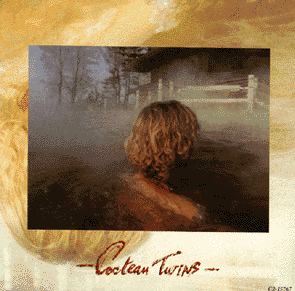
Laugh Lines
Hazel
Peppermint Pig (12" version)
Peppermint Pig - 1983

|
Peppermint Pig (7" version)
Laugh Lines Hazel Peppermint Pig (12" version) |
|
After Lullabies the release of Peppermint Pig came rather as a surprise. The band seemed to have abandoned their mystical sounds and complex patterns for much more straightforward rock songs. The three tracks all sound rather loud, busy, with very quick rhythms, and Liz' vocals occasionally reminds one of Siouxsie Sioux. On the evidence of this release alone one could categorize the Cocteau Twins as 'new wave'. Peppermint Pig though turned out to be just the very first of their many experiments. The EP, solid as it is, in no way foreshadows the amazingly diverse collection that was to become their next album Head Over Heels. The Peppermint Pig EP was later included in both The Box Set and the Lullabies To Violaine compilation, although the latter oddly omitted the 12" version of Peppermint Pig. |
|
Peppermint Pig (7" version) This is the single version of the 12" track. The lengthy instrumental introduction was removed and a short intermezzo towards the end did not make it into this version either. Overall this does not change the character of the song all that much. |
|
Laugh Lines With its inclination towards new wave, staccato guitars and scarcity of vocals Laugh Lines must be one of the most atypical songs the Cocteau Twins ever recorded. There's not a lot to do for Liz in this song, which is predominantly a rather loud duet between Robins guitar and the drum computer. Effectively she sings just a single line during the entire song, twice at the beginning, six more times towards the end of the song. No special vocal effects either - it's as if all the new tricks from Lullabies have been forgotten again. The guitar parts are very rhythmic, fast, but can hardly be called extremely inspired either. The song's simplicity enhances its new wave tendencies, and one might almost see the programmed drums as the most creative element of this song. Since new wave was centered around simple compositions, which needed only the most elementary technical abilities it's hardly surprising that this wouldn't fit the Cocteaus, whose musical style was always based on complexity and technical skills. The result is in a way predictable: a decent track, technically sound, but too simple for a Cocteau song (and on the other hand probably too complex for a truly successful new wave song). It's well known that Robin was later unhappy with the tracks on this EP. The band would soon remedy their lapse by releasing the brilliantly creative Head Over Heels album. |
|
Hazel Bursting with energy Hazel is a track as dynamic as the band would ever record. It's like the threesome enjoyed to go wild for once, and really wanted everybody to jump onto the dance floor. The song is totally dominated by the heavy drums, which is unusual to say the least, considering the band never had a drummer in their lineup. At 270 beats per minute the pace is breathtaking, and the howling guitar and grumbling bass sound as if they just love the party. But the best feature is that despite the hard rock approach Liz' vocals still fit in extremely well. Unlike so many softer Cocteau songs, this one really demands her to use her full vocal powers. She comes out a glorious winner, of course, delivering some of the best dramatic effects of her career. The two other tracks on the this EP may sound as though this loud booming rock style doesn't quite work for the band, but on Hazel they found the golden combination and produced a fabulous song. The band also played a great version of Hazel at one of their BBC Sessions. |
|
Peppermint Pig (12" version) Among the three songs on this EP Peppermint Pig is definitely the one showing the most elements defining a typical Cocteau Twins' track. Having no comprehensible lyrics, a melody which is quite hard to remember, a clearcut bass line, and a distorted guitar surely all fall in that category. On the other hand many things are suddenly very different. Never before did the band release such a loud track. Pounding drums, a prominent bass and heavy guitars all imply Liz has to work hard to deliver any audible vocals. She succeeds - but at a cost. There is no room for subtleties here, no vocal overdubs, clever echoes or soft whispers. It's suddenly all very loud and straightforward, and the vocal parts in Peppermint Pig do her magnificent voice certainly no justice at all. Robin may well have enjoyed the guitar parts here though. Many different lines, high speeds and distortions all appear. If anything is lacking it is certainly not volume or zest. Those loving solid rock music may well feel this is one occasion where the band did not hold back. But overall the song somehow lacks conviction. Only towards the end, when a sudden change of key introduces the last part of the song, does it get really interesting. Suddenly the song comes alive, the instruments really work together and a nice ending is reached. Unfortunately it's all a bit too little too late. Peppermint Pig has its moments, but in view of what the band would do hereafter one can not help feeling that for once their creativity was letting them down a bit. A shortened version of this track was released separately as a 7" single as well. |